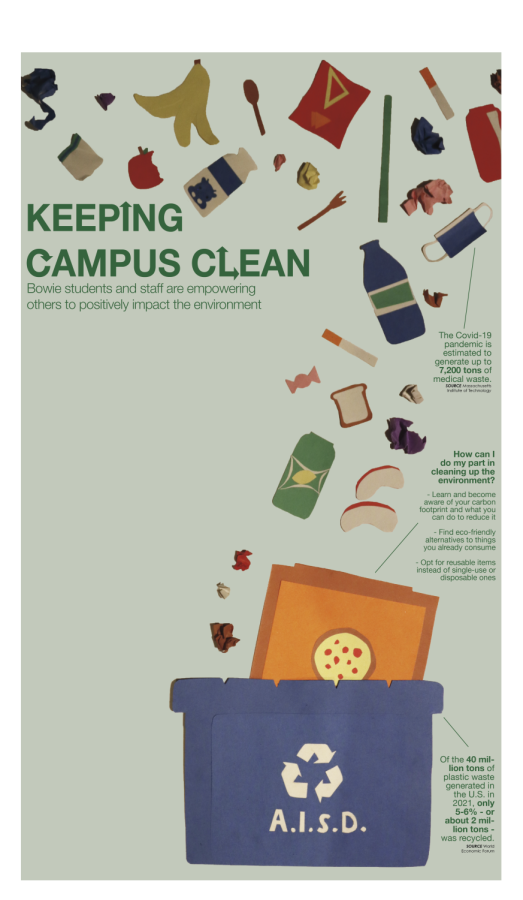Keeping campus clean
Bowie students and staff are empowering others to positively impact the environment
Though there is an attempt to recycle in classrooms, lack of education on the recycling process leaves many on campus incorrectly disposing of their waste.
December 8, 2022
Approaching the trash bins, a student is faced with a crucial decision. Garbage or recycling? With box in hand from the pizza he and his friends ate during lunch, he contemplates which one he should use. In a rush and thinking he is doing the right thing, he throws the pizza box into the recycling. This however, is the wrong choice. Due to the greasy residue left on the box, it is contaminated and unable to be recycled.
Though there is an attempt to recycle in classrooms, lack of education on the recycling process leaves many on campus incorrectly disposing of their waste.
“At times I see people either not recycling something that is recyclable or putting things that are recyclable into the bin,” junior Anika Ratakonda said. “There could be better awareness regarding the commonly recyclable materials generated in the classrooms, so that we are properly recycling instead of trashing.”
According to the U.S. Environmental Protection Agency (EPA), knowing where to correctly place waste is fundamental in reducing landfills. They found that each person produces 4.40 pounds of garbage each day. This adds up quickly with the nation producing about 230 million tons of municipal garbage each year. This garbage ends up in landfills creating a vast amount of water and air pollution. The EPA found that, as plastic takes up to 100-400 years to break down entirely, these landfills will continue to grow without a more efficient way of discarding garbage. Waste segregation is a small step towards this on campus.
“Waste segregation is the separation of waste based on how it can be disposed of more efficiently,” Ratakonda said. “Through waste segregation, waste is redirected from the landfill to be recycled and composted. The harmful effects of landfill waste, such as chemicals, on the environment can be limited.”
Ratakonda is a member of Bowie’s Earth Club, an organization at the school. Aiming for greater waste segregation on campus, Ratakonda and other Earth Club members are researching ways to improve waste management in classrooms.
“I have explored implementing a three bin system, recycling, composting, and landfill waste at Bowie,” Ratakonda said. “The challenge is maintaining the correct separation of waste by all students and staff all the time. Correct separation is vital for successful waste segregation, otherwise, all the ways would end up in landfills.”
Austin ISD is aligned with the City of Austin’s zero waste goal to re-circularize over 90% of our surplus and waste by 2040. Ratakonda’s plans will help contribute to this goal.
“Easing into better waste management with small changes is more viable long-term,” Ratakonda said. “To start, improving recycling efforts in classrooms would be efficient as a lot of the waste generated in classrooms is recyclable. Making the current waste segregation system in the cafeteria efficient is another good starting point.”
Clubs at Bowie have directed time and effort in both cleaning up campus, and taking steps to keep campus clean.
“Student organizations going around and helping clean campus is a great idea because it gets diverse groups involved in helping maintain the campus,” AP Environmental Science teacher Jessica Davis said. “More activities where you could get groups from all over that are involved in all sorts of things to help out would increase the awareness.”
Earth club is one of those student organizations aimed at keeping campus clean.
“Earth Club is a student organization that works on environmental and sustainability related projects and activities,” Ratakonda said. “We conduct trash pick-ups to get the campus clean. We also explore possible eco-friendly changes at Bowie that help with the efficient management of resources and reduce our negative environmental impact.”
Along with earth club, National Honor Society (NHS) also contributes to keeping Bowie clean.
“One of NHS’s main contributions to keeping Bowie clean is trash pickup days,” NHS president Bailey Alsup said. “This started recently and will continue periodically throughout the school year in order to reduce the amount of waste around campus.”
According to the University of Colorado Boulder’s Environmental Center, knowing the impact of the trash a person generates will inevitably lead them to making more environmentally-conscious choices.
“The student body is very powerful when we come together. We can dramatically decrease the waste footprint of Bowie and operate in an eco-friendly manner,” Ratakonda said. “Students will carry the beneficial practices home creating a positive ripple effect in communities. Environmentally sustainable habits built-in young students would stay with them even after they leave Bowie.”
Working to improve the city’s carbon footprint and make strides toward a renewable energy based local economy, Austin has been recognized as a leading U.S. green city in national sustainability studies. Though the city is exceedingly eco-friendly, that does not mean citizens can be any less aware individually.
“We sit on top of aquifers and so we’re in a fairly sensitive zone,” Davis said. “With all the urbanization and build up, anything that we can do individually to protect our green spaces is huge.”
Moreover, a litter polluted campus may affect the learning environment for students.
“A clean campus boosts morale and brings up a kind of a level of respect that people have not only for their surroundings but for each other,” Davis said. “It’s kind of depressing, and demotivating when you’re in a trashed out environment, and so I really do think it’s important.”











